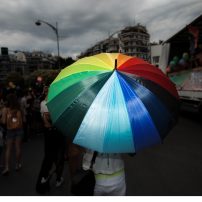
Victory for the LGBT community against bans on public events in Russia.
JUDGMENT
Alekseyev and others v. Russia 27.11.2018 (no. 14988/09 and 50 applications)
SUMMARY
The case, which brought together 51 applications from seven applicants, concerned the continued
refusal by Russian authorities to approve organisers’ requests to hold LGBT rallies.
The Court found that this case was relevantly similar to the case of Alekseyev v. Russia, on which it
had adjudicated in 2010, and that it ought to replicate its judgment in that case in the present
instance.
It thus found, in particular, that the decision to reject the applicants’ requests to hold public LGBT
events could not be justified by concerns over public disorder and was in breach of their right to
freedom of assembly. It also found that the absence of any requirement on the authorities to make a
decision on the events prior to the dates on which they were to be held had amounted to an
absence of effective remedy. The decision to block the LGBT events had clearly been motivated by
the authorities’ disapproval of the theme of the demonstrations, and had thus amounted to
discrimination, in violation of Article 14.
The Court reiterated the obligation of States to implement judgments and noted that Russia would
need to make a sustained and long-term effort to adopt general measures, particularly in relation to
issues of freedom of assembly and discrimination.
PROVISIONS
Article 11
Article 13
Article 14
PRINCIPAL FACTS
The case brought together 51 applications brought by seven Russian nationals. They were Nikolay
Alekseyev, Irina Alekseyeva, Kirill Nepomnyashchiy, Aleksey Kiselev, Sofya Mikhaylova, Yaroslav
Yevtushenko, and Irina Fedotova. They live in Moscow, Shushenskoye (Krasnoyarskiy region), Gryazi
(Lipetskiy Region), Kemerovo, Sonchino (Voronezh Region), and Luxembourg.
At various points between 2009 and 2014, the applicants all submitted notices to local authorities
informing them of their intention to hold public rallies on the issue of lesbian, gay, bisexual and
transgender (LGBT) rights. In each instance the local authorities rejected the proposed date and
location of the rally. The domestic courts, to whom every applicant appealed, upheld these
decisions; in each case the result of the appeal was delivered after the proposed date of the rally.
THE DECISION OF THE COURT
Admissibility
The Court found that 44 of the applications were inadmissible as they had not been lodged within six
months of the authorities’ decision not to approve a public LGBT event.
Articles 11, 13 and 14
Judgment in related case
The Court previously issued a judgment in 2010 in the case of Alekseyev v. Russia (application nos.
4916/07, 25924/08 and 14599/09) involving a similar complaint made by the first applicant in the
present case. Then, the Court concluded that the authorities’ refusal to grant permission for LGBT
rallies, and subsequently-proposed pickets, had constituted a violation of Articles 11, 13 and 14 of
the Convention.
In that judgment, the Court found that the Moscow authorities’ decision to proscribe LGBT events,
and thereby restrict the applicant’s freedom of assembly, had not met the condition of “necessity in
a democratic society”. The risk of public disturbance as a result of counter demonstrations had not
been sufficient to warrant a ban on LGBT events, especially as Moscow officials had not made
adequate efforts to consider arrangements to avoid that disturbance. Nor could opposition to the
events from a majority of society be considered legitimate grounds for banning LGBT rallies. The
Court thus found a violation of Article 11.
In the same judgment, the Court found that the absence of any requirement on the authorities to
make a decision on organisers’ proposed events, prior to the dates on which they were to be held,
had equated to the absence of an effective remedy, and had therefore constituted a violation of
Article 13.
Moreover, the Court noted in that judgment that the primary motivation for denying permission for
the LGBT events had been one of moral disapprobation, as illustrated by public statements in which
the Mayor of Moscow had affirmed his personal opposition to LGBT rallies. The decision not to
permit the events had thus been taken as a direct result of their LGBT-related message, and had
therefore subjected the applicant to unjustified discrimination, in violation of Article 14.
Judgment in this case concerning the seven applications declared admissible
In its judgment today, the Court found no relevant differences between the case of Alekseyev v.
Russia on which it had adjudicated in 2010, and the case of Alekseyev and Others v. Russia currently
before it. Thus, the Russian authorities’ decisions to ban public LGBT events, in the present case, had
also constituted a violation of Articles 11, 13 and 14.
Article 46 (binding force and implementation)
Making specific reference to its judgment in 2010 on the case of Alekseyev v. Russia, the Court
reiterated the undertaking by all Contracting Parties, under Article 46 of the Convention, to abide by
the final judgments of the Court in cases to which they were parties.
While recognising that the question of how to implement Court judgments fell to the respondent
State, under supervision from the Committee of Ministers, the Court nonetheless found it
appropriate to emphasise that the nature of the violations found in the case of Alekseyev v. Russia,
and the extent of the recurring problem at issue, required sustained and long-term efforts in the
adoption of general measures, particularly if Russia was to overcome issues relating to freedom of
assembly and prohibition of discrimination.
Article 41 (just satisfaction)
The Court held, by six votes to one, that the finding of violations of Articles 11, 13 and 14 of the
Convention constituted, in itself, sufficient just satisfaction for the non-pecuniary damage sustained
by the applicants.
Separate opinions
Judge Dedov expressed a concurring opinion and Judge Keller expressed a partly dissenting opinion.
These opinions are annexed to the judgment(echrcaselaw.com editing).


